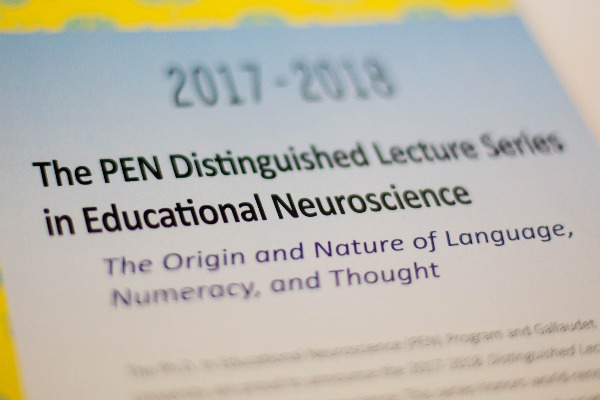PEN Distinguished Lecture Series
The PEN Distinguished Lecture Series in Educational Neuroscience was created in association with the Foundations Proseminar course for graduate students in the Ph.D. in Educational Neuroscience (PEN) program. Since its inception, the series has grown!
The lecture series focuses on the intersection of the Science of Learning (learning across the lifespan) and Educational Neuroscience (learning across early life). Scientists and researchers who are pioneers in the fields of Cognitive-Educational Neuroscience, Developmental Cognitive Neuroscience, and Child Development come to Gallaudet University's campus to talk about their research.
Register for Upcoming Lectures
All lectures are open to the public and are video recorded for online distribution.
PEN DLS brochure for 2024-2025
Minds, brains and how children learn: From infants to society
Human beings are highly social creatures, and our social nature is already evident in infancy. Infants, prior to language, use imitation to learn about physical objects and cultural practices. Infant imitation entails a mapping between action perception and production. This mapping can be described at both the psychological and neural levels. One of the infant’s first and most basic psychological acts is the recognition of others who act, move, and behave like the self. This is captured by a theory of social development I have called the “Like-Me” developmental theory. I propose that this lies at the foundation for human social cognitive development. I will also extend this view to older children, and discuss how pervasive stereotypes about social groups influence children’s emerging sense of self and identity.
Biography:
Dr. Andrew N. Meltzoff holds the Job and Gertrud Tamaki Endowed Chair and is the Co-Director of the University of Washington Institute for Learning & Brain Sciences. He is an internationally renowned expert on infant and child development. Dr. Meltzoff’s pioneering research on young children has had profound implications for cognitive science, especially for ideas about memory and its development; for brain science, especially for ideas about common coding and shared neural circuits for perception and action; and for early education and parenting, particularly for ideas about the importance of role models, both adults and peers, and how cultural stereotypes influence child development. He is the co- author of two books about early learning and the brain: ‘The Scientist in the Crib: What Early Learning Tells Us about the Mind’ (Morrow Press, 2000) and ‘Words, Thoughts and Theories’ (MIT Press, 1997). Dr. Meltzoff has received numerous prestigious international awards, including the Kurt Koffka Medal (Germany) in 2016. He has appeared on educational programs on PBS, ABC, NBC, and the CBC, and in numerous other media outlets.
Education:
Ph.D., Oxford University
B.A., Harvard University
